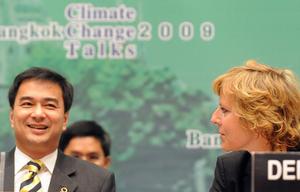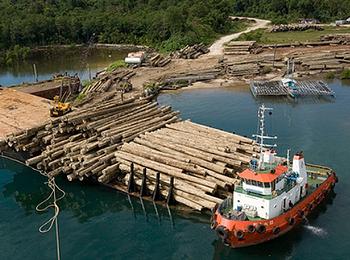New Round of Climate Talks Opens With Stern Warnings
BANGKOK, Thailand, September 28, 2009 (ENS) - United Nations climate change talks resumed today in Bangkok with dire warnings that failure to agree on a post-Kyoto treaty to limit greenhouse gas emissions is a matter of life and death.
In Bangkok, negotiators must advance a draft text for December's Copenhagen talks. Government delegates are wrestling with the two key issues, cutting emissions and paying the costs.
"Our children and grandchildren will never forgive us unless action is taken. Time is running out, we have two months before Copenhagen," Thai Prime Minister Abhisit Vejjajiva said in his opening address to negotiators.
"Much needs to be done and much needs to be resolved. Let us use the two weeks in Bangkok to the full to ensure the future," he told around 4,000 participants, including government delegates from 177 countries, representatives from business and industry, environmental organizations and research institutions.
 |
Prime Minister of Thailand Abhisit Vejjajiva, left, and Connie Hedegaard, minister of climate and energy of Denmark at the Bangkok talks. September 28, 2009 (Photo courtesy Earth Negotiations Bulletin) |
"There is no plan B," the prime minister said. "If we do not realize plan A, we go straight to plan F, which stands for failure."
The Bangkok talks, part of the UN Framework Convention on Climate Change, continue through October 9 and are the next to last negotiations before the Copenhagen meeting opens December 7.
Connie Hedegaard, Danish minister for Climate and Energy, said, "The cost of not delivering in Copenhagen is high, ethically, economically, and politically. We must do it. We must bring the world on the track to a sustainable future. If we have the will it is doable."
The global conservation group WWF warned that the deadly floods now drowning the Philippines should remind delegates that their discussions could mean life or death to millions of people.
Typhoon Ketsana, locally called Ondoy, killed 140 people, displaced 116,000 and affected more than 435,000 others. The storm hit the main island of Luzon Saturday morning. A combination of the storm and monsoon rains has left 80 percent of the city under water, the worst rains to hit Manila in more than 40 years. In just six hours, an amount equivalent to a typical month's rainfall in the rainy monsoon season fell on Manila.
While individual storms and floods can not be linked to climate change, WWF said, the science is clear that more frequent and more severe extreme weather events are are an increasing consequence of climate change.
"The Philippine floods should remind politicians and delegates negotiating the climate treaty that they are not just talking about paragraphs, amendments and dollars but about the lives of millions of people and the future of this planet," said Kim Carstensen, leader of the WWF Global Climate Initiative.
"After months of haggling, losing time and arguing we have now entered the last phase and have an absolutely last minute chance to rescue the climate deal," Carstensen said.
WWF applauded Japan, China and India for outlining concrete mitigation action and for playing an increasingly constructive role in the negotiations, confirming their determination to become the world’s next economic leaders on the basis of a green economy and low carbon growth.
"Pledges such as Japan’s to reduce emissions 25 percent from 1990 levels by 2020 and that of Indonesia to keep emission growth 26 percent to 41 percent below business as usual projections by 2020 are bringing us closer to the global emission reduction targets we need," said Carstensen.
Forest and climate experts from the nonprofit Ecosystems Climate Alliance warned today that negotiations on the forest component of the agreement risk failing to reduce emissions or prevent deforestation.
Negotiators are hammering out the details of the United Nations Collaborative Programme on Reducing Emissions from Deforestation and Forest Degradation in Developing Countries, or REDD.
"The rules for REDD are being set now," said Bill Barclay of Rainforest Action Network, "but forest protection is being ceded to carbon cowboys and corporate greed. If we don’t act now to prioritize the protection of intact natural forests including their soils, we will lose a unique opportunity to end the deforestation and degradation that is contributing to climate change."
 |
Illegally logged timber loaded aboard a barge near Nabire, Papua, Indonesia is discovered by a Greepeace research team. (Photo (c) Greenpeace/Rante) |
Destruction of tropical and peat swamp forests accounts for nearly 25 percent of global greenhouse gas emissions, and has been among the most contentious and complex issues in the climate change negotiations.
The international community committed to address deforestation in the 2007 Bali Action Plan, pledging to create, "Policy approaches and positive incentives on issues relating to reducing emissions from deforestation and forest degradation in developing countries; and the role of conservation, sustainable management of forests and enhancement of forest carbon stocks in developing countries."
But negotiations to date are failing to deliver on that mandate. Hopes for protecting forests through the United Nations negotiatings process require renewed focus on protecting intact natural forests through avoiding deforestation and forest degradation, and progress must be achieved at the Bangkok meeting.
Agricultural commodities, biofuels, and wood and paper products, in many cases being produced in illegal or highly unsustainable ways, are driving global deforestation and degradation.
"Without policies and measures to reduce market demand for illegal or unsustainable commodities, countries around the world will be consuming in ways that undermine the same REDD activities their dollars are going to support," said Andrea Johnson of the Environmental Investigation Agency, a member of the Ecosystems Climate Alliance.
The Alliance is calling on all country delegations to change the "deficient definition of forest" being used in the climate negotiations. The group maintains that the UNFCCC definition of forest does not distinguish between natural forests and plantations.
The groups say that unless this is changed, measures to introduce REDD into a future climate agreement could have the perverse result of encouraging conversion and destruction of the world’s remaining natural forests.
A subtle change of language from the original Bali mandate now frames the entire scope of REDD, warns the Ecosystems Climate Alliance, which objects to the term "sustainable forest management," that in practice is closely associated with the logging industry and destructive activities such as industrial-scale logging of intact natural forests.
"Sustainable forest management is industry-speak for logging," said Sean Cadman of The Wilderness Society.
"Forests that have been logged or degraded have lower carbon stocks, less biodiversity and less resilience than primary forests. Tree plantations are even worse. REDD provides the opportunity to break the cycle of industrial-scale deforestation by placing economic value on the role of standing forests in climate change mitigation," Cadman said.
Since an estimated 1.6 billion people in developing countries are dependent on forests for their basic needs and livelihoods, REDD must directly benefit local communities and Indigenous Peoples and respect their rights and tenure.
"There is an increased understanding in the REDD negotiations that forests cannot be effectively protected without securing the rights of forest dependent communities," said Nathaniel Dyer of Rainforest Foundation UK, "but the current text does not sufficiently reflect this and must be strengthened."
Copyright Environment News Service (ENS) 2009. All rights reserved.
To subscribe or visit go to: http://www.ens-newswire.com